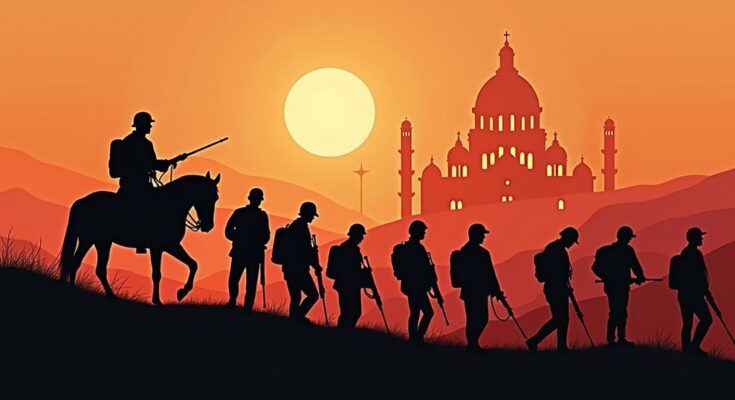As Tunisia approaches a presidential election, concerns are growing regarding the military’s escalating involvement in politics under President Kais Saied, who has sought the military’s allegiance since his election in 2019. The army, which once played a minimal role under past regimes, has gained prominence—manifested by ministerial appointments of military leaders—sparking fears over the preservation of democratic norms. With tensions emerging between Saied and military figures, the situation remains fluid and precarious, particularly regarding the upcoming electoral process.
In the years following the 2011 revolution in Tunisia, the role of the military has evolved notably, especially under President Kais Saied, whose ascent to power has sparked concern regarding the army’s burgeoning influence in politics. Previously marginalized during the regimes of Presidents Habib Bourguiba and Zine el-Abidine Ben Ali, the Tunisian army began to garner respect as a protector of democracy post-revolution. The military’s popularity began to rise after it was perceived as a bulwark against tyrannical governance, particularly during the 2011 uprisings that ultimately led to the ousting of Ben Ali. Upon taking office in 2019, President Saied actively sought to cultivate a favorable relationship with the military, an essential step that facilitated his consolidation of power in July 2021. Since then, military involvement in governmental affairs has become unprecedented, with high-ranking officers appointed to ministerial positions, raising eyebrows about the army’s level of political engagement. As Tunisia heads into a presidential election, many observers express apprehension about the army’s role, especially given accusations of an unfair electoral process. Historically, Tunisians had long viewed the military’s role predominantly in logistics and security, particularly following the revolution. The army was reportedly instrumental in maintaining order and overseeing electoral processes, thus enhancing its public image. The Tunisian military has also benefitted from international partnerships, primarily with the United States, which has significantly bolstered its resources and capabilities. Under President Saied, the military has received increased funding, which has improved its overall operational capacity. At the same time, Saied has leveraged military support to quell dissent, driving some of his political opponents before military courts—a move that raises questions about the balance of power between the presidency and military leadership. As Saied asserts greater control, tensions between him and top military figures have surfaced recently, particularly surrounding issues such as medicine shortages and water supply management. Reports indicate that some military officials may disapprove of Saied’s tactics, especially concerning the arrest of political figures, suggesting a friction that could complicate the regime’s stability. As elections loom, the military’s legacy as a guardian of democracy appears to be under scrutiny. With allegations of undermining democratic principles, the military faces a critical junction regarding its future role—whether to uphold republican values or succumb to authoritarian tendencies exemplified by the current administration. The outcome of the upcoming election could render significant implications for Tunisian democracy and the military’s role within it.
Historically, the Tunisian army has maintained a cautious distance from political engagements, particularly under the leaderships of Bourguiba and Ben Ali, where it was often seen as a potential threat to state security. After the 2011 revolution led to the decline of authoritarian rule, the army emerged with a renewed public image as a protector of democracy. However, this perception has shifted since Kais Saied’s electoral victory in 2019, whereupon efforts to solidify military alliances have led to increased military influence in government capacities. This development raises essential questions about the intersection between military power and the principles of democratic governance in Tunisia.
In conclusion, the increasing role of the Tunisian army in politics, particularly under President Kais Saied, presents a complex landscape ahead of the impending presidential election. The military’s historical role as a protector of democracy is at a crossroads, challenged by Saied’s consolidation of power and suppression of dissent. The upcoming election will serve as a critical test of the military’s commitment to democratic principles and its potential influence on Tunisia’s future political climate.
Original Source: www.middleeasteye.net




